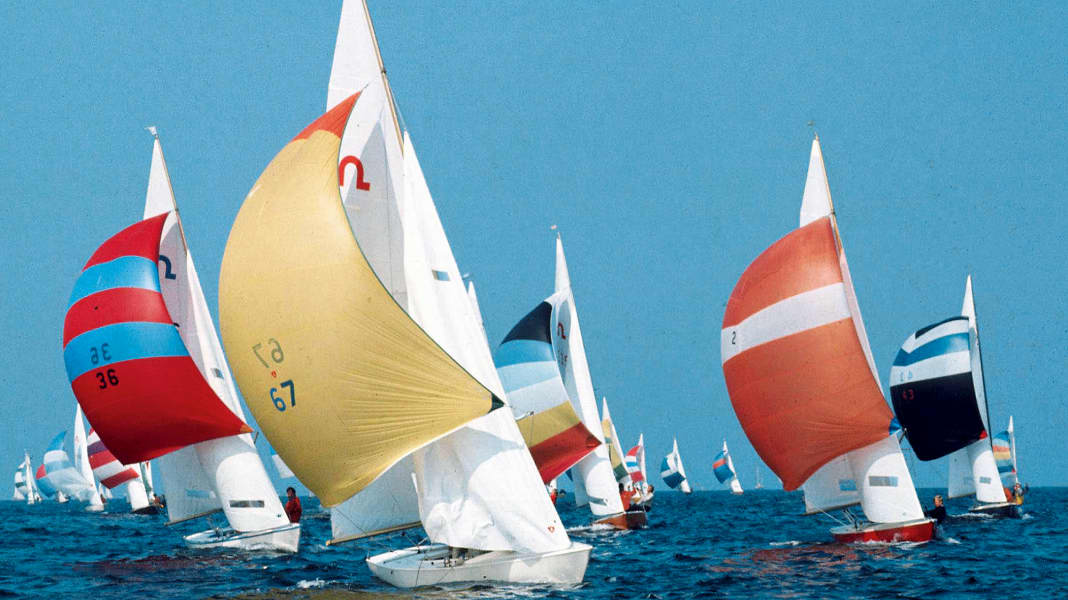
The anniversary programme
The sporting event of the century, the 1972 Olympic Games, will be celebrated in Kiel in August and September. The programme brings stars and boats from the past back to the fjord. As a bridge to the sailing sport of the future, the joint International German Youth Championships will be held from 10 to 16 August ( here to the report ) and from 17 to 21 August the revival of the 1972 Olympic regatta in four classes from back then. These include Dragon and Starboat, Tempest and Flying Dutchman. Finn dinghy and Soling are not included. A huge sports, cultural and city festival accompanies the celebrations. At the end of the "Olympic comeback", which will last around a month, Kiel's most successful athletes will be honoured on 8 September. An Olympic exhibition will be on display in the DSV lounge in Schilksee. On display are films, documents, German Olympic medals, a Finn dinghy from 1972 and more. A club evening is planned there for 18 August (info: dsv.org ) with many exciting guests. Including: Ulli Libor, FD bronze medallist from 1972, who knows how to tell exciting and authentic stories about the Kiel Olympic regatta. Locations, dates and times for all anniversary events can be found at www. 50jahreolympiakiel.de
Six classes from back then, all no longer Olympic
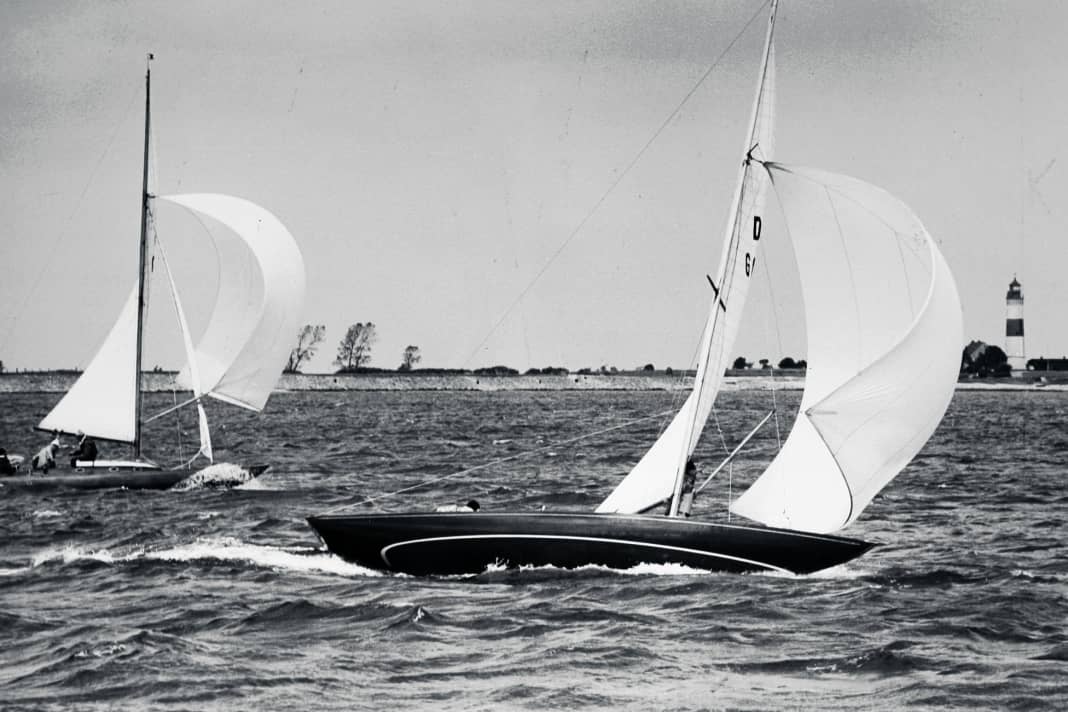





Participants remember
Olympic big bang, sporting defeat or the greatest atmosphere ever at the Olympic Games. If you ask three great German Olympic sailors, Schümann, Libor and Kuhweide, about the memories of the Games of their lives, the answers are very different.
Jochen Schümann from East Germany, who later became the most successful German sailor, experienced the 1972 Games as an 18-year-old in the Olympic youth camp. For him, it was the initial fulfilment of all his dreams. He explains: "In 1968, my family had a television for the first time and we were able to watch the Olympic Games. In 1972, I was allowed to go to the Olympic youth camp. We were treated almost like Olympians and were allowed to go almost everywhere. It was extremely impressive. The regatta itself wasn't so nice with little wind and fog, but the live experience was unbeatable. We were also in Munich - in between half of Germany, which you could see. As a small Ossi, I saw the big world more openly than ever imaginable. And suddenly I was a part of it." Four years after this initial spark in Kiel, the inflamed Olympian Jochen Schümann won Finn gold in Kingston - the foundation for his world career in sailing.
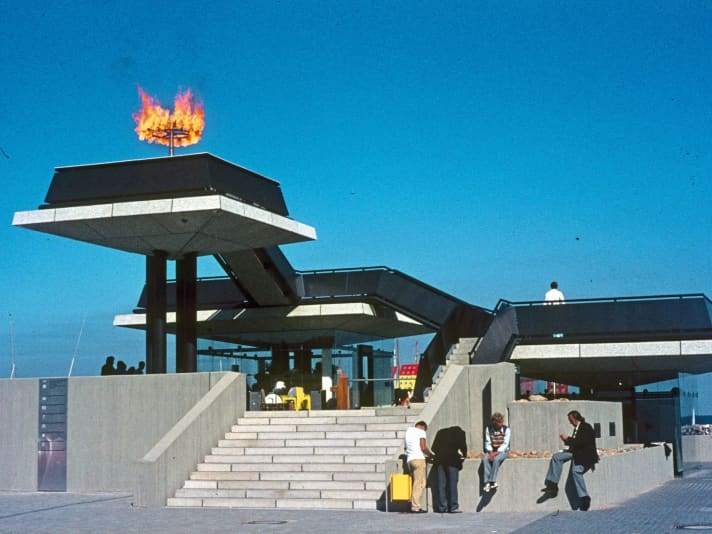
Ulli Libor, almost twice as old as Schümann at the time at 32 and very experienced both as a sailor and as a boat technology pioneer, wanted to improve on his FD silver in Mexico in 1968, but ended up with bronze. In an Olympic extra in YACHT from 1 September 1972, he is quoted in the headline: "You can't even make a disappointed face here." The FD helmsman and his skipper Peter Naumann had every reason to be frustrated, as they had started the summit meeting on the fjord as co-favourites. However, they slipped down to seventh place at the halfway point in the foggy conditions and had to fight. Which is why the bronze medal after their commanding victory in the final race did not feel like the gold they wanted, but still felt like a small happy ending.
The Olympic regatta in Kiel was the only one of its kind up until the stop in Munich. Even Los Angeles 1984 couldn't keep up.
And then there was Willy Kuhweide, who enjoyed his home match off Kiel as star boat helmsman with Karsten Meyer until the penultimate race. Then the meanest and most persistent wind hole of his career robbed him of his tangible Olympic victory. Nevertheless, the 1964 Finn Olympic champion enjoyed the thrilling Olympic atmosphere right up until the assassination attempt: "The Olympic regatta in Kiel was lonesome top until the attack in Munich. Even Los Angeles 1984 couldn't keep up with it."
While Libor and Kuhweide won bronze twice for the Federal Republic of Germany, the GDR sailors Paul Borowski, Karl-Heinz Thun and Konrad Weichert successfully bent their trend curve upwards. Once again in action with the legendary kite "Mutafo", the crew from SC Empor Rostock won silver after bronze in Mexico off Kiel. "Paul was more one of the old sailing types, a short, stocky kite sailor who had what it takes. He was a rather quiet type, a typical fish head and later a very good coach. And not just for his talented sons," recalls the then young Berliner Jochen Schümann of the sailing rock in the GDR team. His son Jörn Borowski won Olympic 470 silver 18 years later. The dragon with the sail number 37 also became a star off Kiel, as Peter Ahrendt, Ulrich Mense and Wilfried Lorenz had already won silver with it in Japan in 1964. The same boat winning three medals at three consecutive games? Unthinkable from today's perspective.
Two German teams
The 1972 Olympic Games were also characterised by two German teams that were initially split apart. Although East and West German sailors had already competed with two teams in Mexico, they had still competed under a common black, red and gold flag with the Olympic rings on it and a common anthem. In Kiel, a separate emblem, different clothing, a separate flag and a separate anthem marked the turning point. Borowski, Thun and Weichert won the direct German-German comparison for the national sailing team of East Germany, as they were officially known, with their silver medal single-handedly according to the classic calculation model for nation rankings.
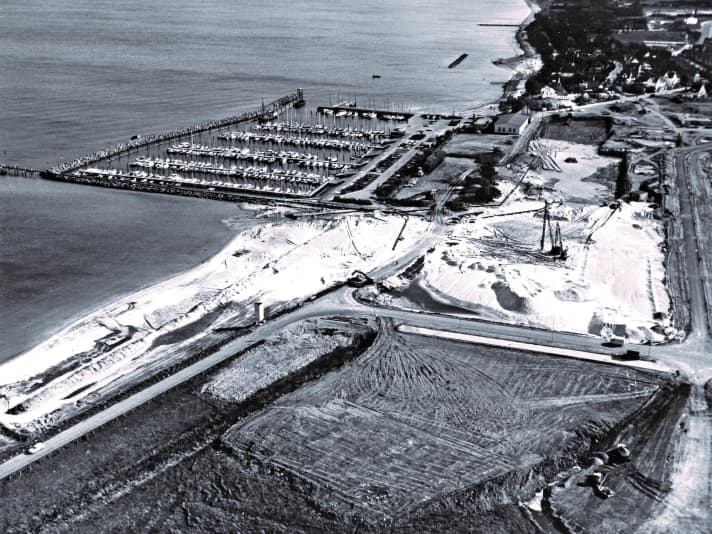
When the centenary event of the Olympic Games in Munich and the sailing regattas in Kiel is celebrated on and around the fjord this late summer, many different memories will come flooding back. Thomas Weikert, President of the German Olympic Sports Confederation (DOSB), has put into words why this is the case: "The 1972 Olympic Games have burned themselves into Germany's collective sporting memory." Of the total of 7,170 athletes from 121 countries at the time, the 318 sailors from 42 countries in Kiel accounted for just four and a half per cent. And yet they were given a gigantic sports venue for their performance, which set new standards, even if the concrete charm of the 1970s is not obvious to everyone: the Kiel-Schilksee Olympic Centre. "The size of the harbour was unbelievable, the sailing stadium and the opening ceremony in front of the terrace buildings, the arena where everything took place was unique in the world at the time, a stand-alone, large and huge," remembers Jochen Schümann.
The size of the harbour was incredible
"We have a lot to thank the Olympic Games for," says Kieler Woche sports director Dirk Ramhorst, recognising the importance of the investments. From 1960 to 1965, Schleswig-Holstein's state capital Kiel had already invested around 3.8 million Deutschmarks in construction work, replacing old bridges, jetties and piers with new ones. The harbour in Schilksee was renamed the Olympic harbour. Kiel was awarded the contract to host the Olympic Games on 18 March 1967, marking the start of a second, massive wave of construction work, at the end of which the new Olympic port, at 285,000 square metres, was around twice as large as the old one. The federal, state and city governments are said to have paid around 150 million Deutschmarks for the most modern sailing arena of its time and its transport links. The state capital owes its motorway connection to the Games in the first place.
A "Hamburger Deern" takes off
In sporting terms, the 1972 Olympic sailing regatta was an all-male affair, although Olympic sailing was theoretically open to women from the outset. Although 17 per cent of all athletes at the Games in Germany were female, sailing was zero per cent female at the time. For Hanne Bense, the sports summit was nevertheless the starting signal for a career that contributed significantly to the entry and breakthrough of women in Olympic sailing. As an employee in the Press and Protocol Department at the German Consulate General in New York, the "Hamburger Deern" accompanied her boss, the German Consul General Klaus Curtius, to Munich in 1969 to help plan the Olympic Games. Curtius had been appointed special Olympic ambassador.
Through his mediation, Hanne Bense became one of the six chief hostesses on the Munich organising committee. She would like to return to her Elbe sailing roots and work at the sailing regatta in Kiel. Klaus Curtius tells her that she needs to get to know Berthold Beitz. The former chief representative of Alfried Krupp had established a personal connection to Kiel through his sailing-enthusiastic employer and bronze medallist at the 1936 Olympic Games. Bense met Beitz at Krupp's Villa Hügel in Essen, where she introduced herself to the industrialist and later member of the International Olympic Committee (IOC).
Beitz is a member of the organising committee for the 1972 Olympic Games and chairman of the committee for the Olympic sailing regatta. He likes the fact that Hanne Bense is a sailor. He hires her. At the beginning of her new job, she is almost fired because she refuses to give the hostesses on the escort boats in Kiel dirndls. In the end, she is able to assert her opinion that the traditional costume look does not go well with wind, waves and boats. The last sentence in her final certificate from the Olympic Organising Committee reads: "Miss Bense was a very good employee. She made a significant contribution to the success of the Olympic sailing competitions in Kiel."
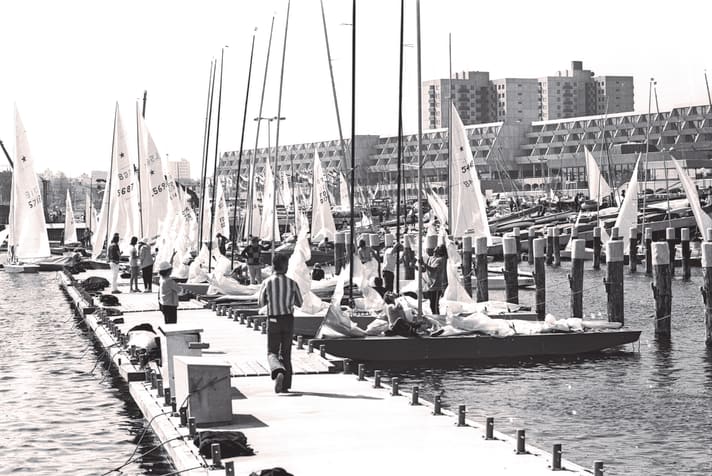
The Hamburg native then remained involved in sailing at an international level, competing in further Olympic Games, for America's Cup teams and also in ten Admiral's Cup events for the British organisers. Between 1982 and 1990, Hanne Bense was Chairwoman of the Women's Committee of the World Sailing Federation and played a key role in the IOC agreeing to the proposal in 1984 - 16 years after the Kiel Games - to allow an all-female class for the first time in the 470 off Busan in Korea.
In 1972 only men were at the start
In 1972, however, it was still exclusively men who characterised the events in Strander Bucht and out on the fjord. Among them were such prominent blue bloods as Spain's King Juan Carlos, who sailed to 15th place in the Dragon. And Prince Harald of Norway, King of Norway since 1991, who came tenth in the Soling. He did so with an Elvstrøm boat and also competed against its producer himself. Paul Elvstrøm, probably the most accomplished sailor in Olympic history with 13 world championship titles in eight boat classes, would have loved to have won his fifth gold medal in Kiel. Instead, the great Dane sailed to 13th place, while he became the target of discussions at the time about the amateur or professional status of Olympic athletes. If the amateur advocate and IOC President Avery Brundage had applied the same strict measures to the Scandinavian and other well-known sailors who were already earning money with and in their sport at the time, which led to the Austrian skier Karl Schranz being banned from participating in the Winter Olympics in Sapporo, Elvstrøm and a number of other big names would have had to pack their bags.
It is rumoured to this day that IOC member (and sailor) Constantine of Greece prevented Elvstrøm and other prominent professionals such as the American Harry "Buddy" Melges and the Brit Rodney Pattison from falling out of favour with Brundage. This was reported by the news magazine "Der Spiegel" in September 1972, not without this smug remark: "In no other Olympic discipline are sport and business so unabashedly intertwined as in sailing." Since then, the debate about professional and amateur status has long been a thing of the past. Today's Olympic champions are generally full-time sailors. There is hardly any other way to meet the highest demands. The discussions in Kiel 50 years ago helped to pave the way for this.
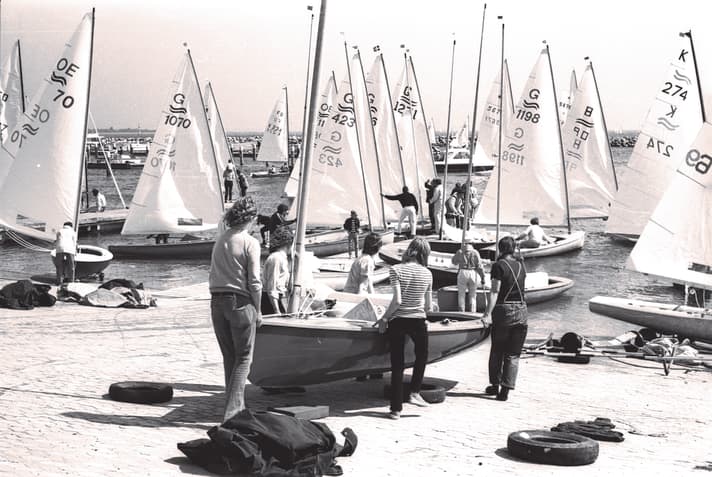
What remains of the 1972 Olympic Games, which began so cheerfully in human terms, is also the dark shadow of the Munich assassination attempt. News of this reached the sailors in Schilksee, 900 kilometres away, first with a delay, then with full force. Ulli Libor remembers: "The sun was shining that day. The wind was light. We were surprised that a police boat was suddenly constantly circling the Israeli FD. We wondered if they had done something wrong. At first nobody in the harbour knew anything for sure. Then the terrible news of what had happened in the Olympic village in Munich came in bit by bit."
Then the terrible news of what happened in the Olympic village in Munich came one after the other.
When the sailors learned of the attack by the Palestinian terrorist organisation Black September on the Israeli team after returning to port on 5 September, "grief and helplessness" prevailed, as Willy Kuhweide recalls. One day after the terrorist attack, in the course of which eleven members of the Israeli team and a policeman were murdered and five hostage-takers also died, IOC President Brundage utters the most famous sentence in Olympic history at the memorial service: "The Games must go on!"
Security measures were also tightened in Schilksee. "But we had fewer worries about us sailors," remembers Ulli Libor, "Kiel was easy to seal off." In an Olympia Extra shortly after the end of the Olympic regatta, the YACHT editorial team wrote under the heading "The bolt from the blue": "The question of whether it was inhumane to continue the Games on the still wet blood of the Israelis will be passionately debated for a long time to come." To this day, the answers are diverse. The majority of athletes, according to double Olympic champion Heide Ecker-Rosendahl, were in favour of the continuation.
The terror tragedy will not be forgotten during the anniversary celebrations this summer. On 5 September, the victims of the Munich Olympic bombing will be commemorated at the Kiel-Schilksee Olympic Centre and other locations around the city.

Tatjana Pokorny
Sports reporter

